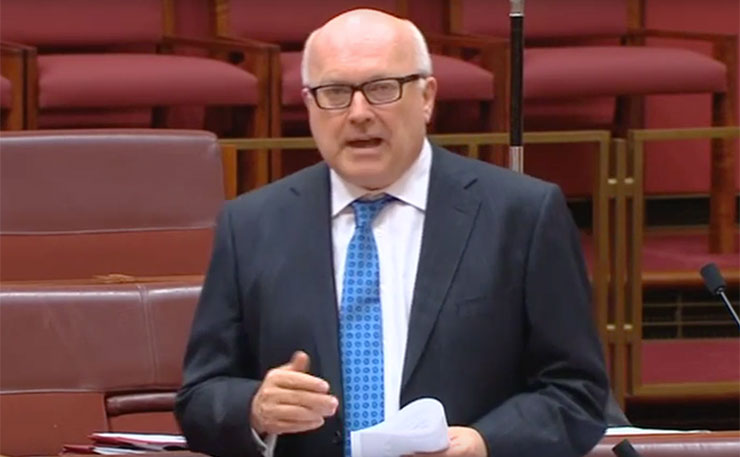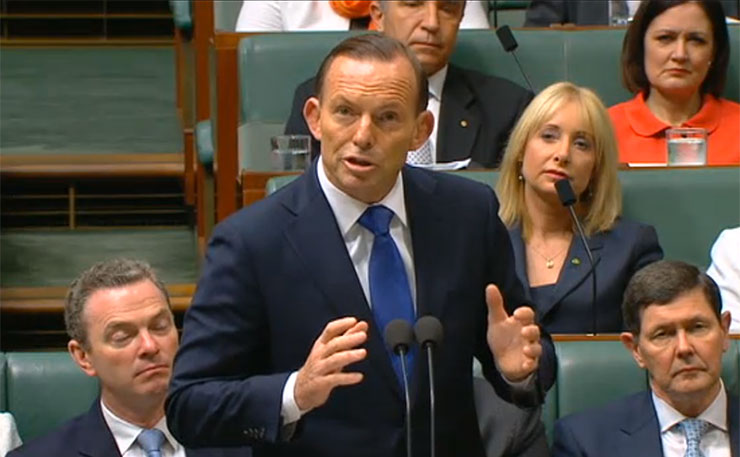The Turnbull Government will be watching with interest and angst for a soon-to-be-released book which sheds light on an extraordinary chapter of Australian-East Timor history, writes Alex Mitchell.
Canberra lawyer Bernard Collaery has written an explosive account of his legal battle to secure the rights of East Timor over offshore gas fields.
His untitled book is held under lock and key in London where Collaery works on the final chapter.
The extraordinary secrecy surrounding the production of his book reads like a John Le Carré spy novel. But there are good reasons for the elaborate precautions that he is taking.
In December 2013, Collaery’s law practice in Canberra was raided by agents from the Australian Security and Intelligence Agency (ASIO) acting on a warrant issued by then Attorney-General George Brandis, the recently appointed Australian High Commissioner in London.
Brandis confirmed that his raiding party seized documents “on the grounds that they contained intelligence related to security matters”.

In fact, Brandis was complicit in a cack-handed attempt to intimidate a witness who was about to testify that he had bugged East Timorese Cabinet ministers and officials over their legal action to gain fair and adequate royalties for natural gas from fields within the country’s territorial waters.
According to independent sources, the Australian government stood to receive $40 billion in oil and gas revenue from the project in the “Greater Sunrise” basin while the poverty-stricken East Timorese would have received “crumbs”.
The ASIO raid was regarded as a strong-arm tactic to put maximum pressure on the former ASIS agent, known as “Witness K”, who was due to give evidence about the original bugging of the Timorese government’s Cabinet office.
His evidence threatened to sink the Australian government’s defence because the witness was irreproachable: he had been a member of the ASIS team which installed the electronic bugging equipment.
Collaery, who has a history of taking up legal cudgels on behalf of Indigenous clients, refugees and citizens victimised by bureaucratic incompetence, said at the time of the ASIO raid: “These tactics are designed to intimidate the witness and others coming forward. It’s designed to cover up an illegal operation in 2004 by ASIS.”

At the time then Prime Minister Tony Abbott quickly defended the ASIO raid saying: “We don’t interfere in cases, but we always act to ensure that our national security is being properly upheld. That’s what we’re doing.”
When the raid took place, former Perth journalist David Irvine was the head of ASIS (2003-2009) and he was ASIO’s director-general (2009-2014) when Collaery launched legal action in The Hague.
Australia’s foreign minister during most of this critical time was Alexander Downer, until recently Australian High Commissioner in London. Downer was a prime witness in the Australian Wheat Board’s UN sanctions-busting scandal involving President Saddam Hussein of Iraq and then he became a principal partner in the negotiations for LNG rights for the fledging government of Timor-Leste.
In the past few weeks it has been revealed that Downer received information about Russian links with Donald Trump’s Republican campaign for the US presidential election and the dossier was subsequently leaked to the FBI in Washington DC. By this stage, Downer’s career was starting to look more like the Pink Panther’s rather than George Smiley’s.
Collaery and other observers of the Timor-Leste deal with global mining giant Woodside Petroleum were uncomfortable with Downer’s decision to accept a position as a highly-paid lobbyist for Woodside after he left politics in 2008.
Collaery, a former member of the ACT Assembly (1989-1992), deputy Chief Minister and the ACT’s second Attorney-General, is hoping his book will throw the spotlight on the Australian government’s bullying behaviour towards smaller neighbouring countries.
In a guarded Lowy Institute address two years ago Collaery spoke publicly about some of the issues in his forthcoming book. “I can reveal that Witness K is no ordinary intelligence officer,” he said. “He is a patriotic, loyal, very long-serving senior Australian who stood up for our national security.
“The other thing I want to reveal is, after we drafted a letter to Julia Gillard, saying we wanted confidential arbitration in relation to the espionage, it was the Labor government that authorised clandestine monitoring and other devices to be installed in my chambers, offices and Witness K’s home.”
But perhaps the politically damaging revelation will impact on Prime Minister Malcolm Turnbull. Shortly after he defeated Tony Abbott in September 2015 to become Australia’s 29th prime minister, the Timor-Leste government requested formal talks to settle the legal impasse. Turnbull rejected the approach out of hand.
Collaery’s book may prove that this arrogance was fatally short-sighted.
Donate To New Matilda
New Matilda is a small, independent media outlet. We survive through reader contributions, and never losing a lawsuit. If you got something from this article, giving something back helps us to continue speaking truth to power. Every little bit counts.




